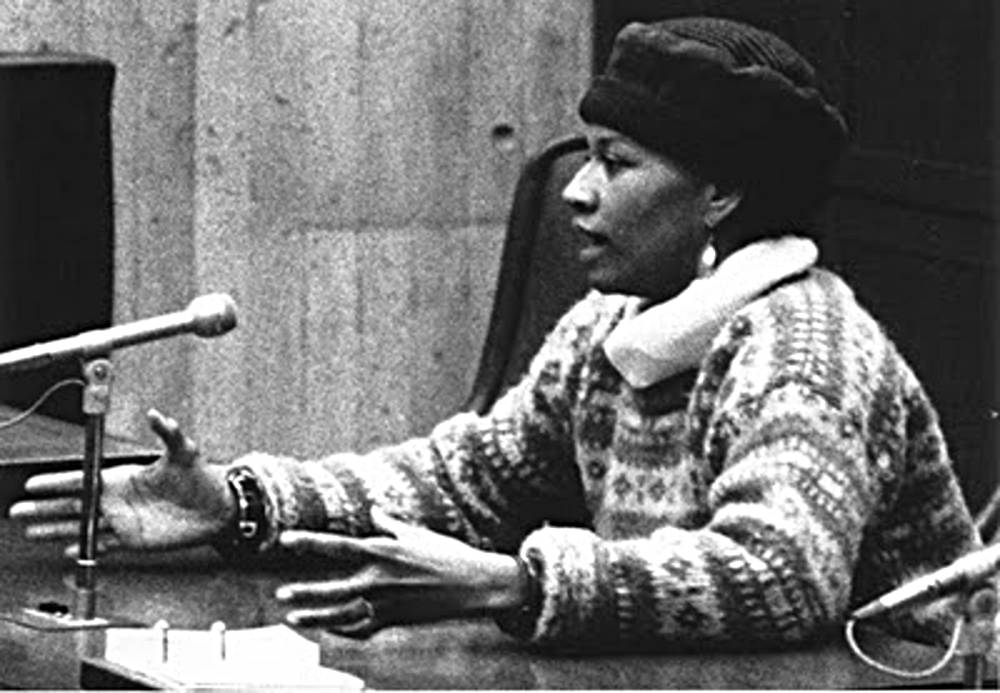
Below is an interview with Savina Martin, one of the key leaders of the National Union of the Homeless (NUH). The NUH was a national organization of and led by the homeless, active in the 1980s and 90s, reaching 25 chapters and around 25,000 members at its height. Ms. Martin was a founding leader of the Boston Union of the Homeless as well as playing a key role in the national organization. Today, Ms. Martin continues to organize among the homeless. A veteran and a woman of color, today she works particularly among homeless women veterans in Boston.
This interview was conducted by Rev. Erica Williams at the 2016 Jobs with Justice national conference in Washington, D.C. It was transcribed by Nancy Taylor and edited by Daniel Jones.
Rev. Erica Williams: How did you get involved with the National Union of the Homeless?
Savina Martin: The Union was founded in Philadelphia, to give you a little bit of history, by several homeless men who were fed up with the injustices that were going on inside of the shelters and they used the slogan “Dignity and Fairness.” When I heard Chris Sprowal [one of the founders] speak in Cambridge, Massachusetts, I just put my hand up like, “Here I am, just send me!”
We held the founding convention [of the Boston Union of the Homeless] at the Harvard School of Divinity in Boston somewhere around 1985-86, and I became the president of that local chapter. And we began to organize all over the country, different chapters. We were an organization that was a union and was founded by former and current homeless men and women who were organizing to take back what was ours: taking back our jobs; we were going to take back our children; we were going to take back our communities; we were going to take back the housing. In fact, one of our many, many offensives was the housing takeovers. We would coordinate actions of civil disobedience of housing takeovers and building tent cities.
EW: What kind of work do you do today?
SM: Homeless men and women in this country are displaced workers undergoing traumatic experiences from the conditions of poverty. And today we need to organize to bring about a change. We need to organize the change. Today, in 2016, I have been organizing around veteran, homeless women of color for about the past 5 or 6 years.
General Eric Shinseki, Secretary of Veterans Affairs here in Washington, D.C., resigned last year, on the heels of the scandal at the VA Hospital. They were padding the numbers and failing to give, veterans their proper healthcare, especially women. Veteran women, some studies show, are the fastest growing population of homeless women in this country.
I worked in a tent in San Diego, California on Navy property. It was a facility tent, probably 1500 square feet, that held 150 veterans on bunkbeds for the winter season, and the conditions were deplorable. So this country has not treated homeless veterans with the respect and the dignity that they deserve and this reality has been exposed. Now we have Secretary McDonald who has basically confessed publicly about the lack of services and resource availability around veteran women.
But the responsibility lies with us on the ground who are activists and organizers and advocates to begin to demand policy change, to demand that the funding is allocated to responsible agencies that are going to assist with the mental and emotional disease and spiritual death that veterans have experienced while deployed, and now deployed back to the shores of this country and they’re re-traumatized.
Right now we are merging non-homeless veterans and homeless veterans to come together and build and create unions. My takeaway today is that we need to lead in this struggle; all hands on deck. As a veteran woman, we need everybody on the ground. We are at ground-zero and we need to continue to organize among “the least of these” and take back this country, we need to take back this country.
EW: What are your thoughts on the new call for a new Poor People’s Campaign?
SM: Seize the moment. It’s right on time, it’s organic. This is happening naturally as movements do. We need to be clear and concise in our organizing. We need to plan strategically and target where we’re going with our demands. My thoughts are [that] it’s right on time, it’s right on time.
This construct needs to be dismantled, one brick at a time, [and] it’s gonna take all of us, though. It’s gonna take all of us. That’s what I would say about building partnerships – that we all need to come together. All women and men, religions and orientations, who are suffering in this country need to come together and not allow the 1% of this world, of this nation, to dictate to us their agenda. We need to organize for the people to be able to live with a good quality of life, and that’s human rights. So we need to build, we need to continue to build towards this poor people’s movement.
It’s my responsibility and accountability to do something, to make a contribution just like those that came before me whose shoulders I stand on, who made a contribution to the movement to get us to this point. So as a woman in this struggle, a woman of color in this struggle, a woman who has felt the suffering across this nation, it’s my responsibility to link arms in this sisterhood and in this brotherhood. It’s an urgent time that we live in, it’s an urgent time. People are dying, people need jobs, a livable wage, and it’s gonna take each and every one of us to come on board and understand [and] educate. Each one teach one. That’s why I’m here.
EW: Any more words you’d like to share with the Poor People’s Campaign?
SM: Let’s organize! Let’s organize! Build a movement.